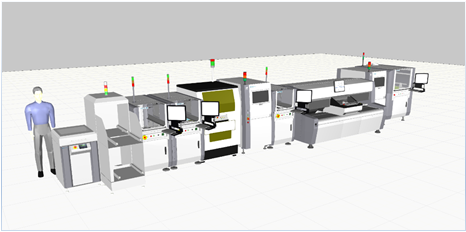Master thesis project: Life Cycle Analysis of the production line for stretchable electronics
Application Deadline: 2019-12-15
Background
This thesis is a collaborative project between Mycronic AB and the department of Production Engineering (IIP) at KTH
Mycronic AB is a Swedish high-tech company that designs, develops and manufactures machines for the efficient production of electronic devices. The Assembly Solutions product area of Mycronic is focused on offering effective solutions for the electronics production. In spite of the fact that we use devices that have impressive processing capacity in a manageable form factor, the development to further miniaturise and improve these will continue undaunted. Together with increased miniaturisation, we will see increasingly flexible and stretchable devices that will challenge current manufacturing methods. With the emergence of flexible and stretchable manufacturing methods, sustainability aspects of industrial production are becoming increasingly important both from environmental perspective and cost of ownership viewpoint.
Manufacturing and Metrology Systems (MMS) division at the department of Production Engineering (IIP) focuses on Circular Manufacturing Systems (CMS) as one of its key research areas. Since 2011, the MMS division is supporting manufacturing industry as to intentionally design CMS. One of the aims of CMS is to create a balance between economic and environmental sustainability and therefore, it is important to measure the economic and environmental performance of any new systems aimed to implement CMS. Since the overall aim of both Mycronic AB and MMS division is well aligned, a collaborative thesis project has been launched to strengthen the research in this direction.
Project and objective
As part of the thesis project you will be working on an EU funded H2020 research project ‘Soft intelligence epidermal communication platform - SINTEC partnered by Mycronic AB. The SINTEC project focus on demonstrating a novel large bandwidth and low-dispersion sensor network platform by utilizing stretchable electronics and the pioneering Fat-IBC. The hardware development will be on realizing an innovative rigid-stretch elastomer PCB technology using, initially, a two-layer liquid alloy circuit, pick-and-place assembly of advanced rigid modules or components, and encapsulation. Industrial partners will exploit the results in manufacturing technology, Fat-IBC, and in biomechanical and physiological applications of soft and compliant wireless intelligent patches, e.g. in preventive care, sports and fitness, and clinical medicine. The production of these devices will demand a novel production line, see Figure 1.

Figure 1: Concept of production line for stretchable electronics.
The overarching objective of the project is to study and quantify the sustainability of electronics from the perspective of the assembly process, with respect to traditional rigid electronics, as well as novel, flexible and stretchable variants. Here sustainability refers to measuring various typical lifecycle impacts, such as carbon footprint and energy usage etc.
Task description
The project entails approximately 5 months fulltime studies. As your main task, you will be conducting a comparative study of lifecycle impacts of current (conventional) manufacturing methods with a novel, flexible and stretchable methods, using the lifecycle assessment approach (LCA). To fulfill the project and master thesis objectives your work should include:
- Learning and understand the LCA (if you are not already familiar with LCA) approaches
- Finding and applying appropriate research methods and LCA approaches
- Literature review
- Data collection from various sources using various method such as literature search and interviews etc.
- Analyzing of the results
- Writing the thesis report and defending the research publicly
- Other tasks that are necessary to fulfil the objectives
Your profile:
The candidate should be in the final semester of their master’s study in the field of mechanical engineering, production engineering, industrial ecology, environmental engineering or equivalent. The candidate must be capable of taking initiative and drive the research independently. The candidate is required to have excellent communication skills in English, both written and spoken and good interpersonal communication skills. Having previous knowledge in LCA is a plus and communication skills in Swedish will be weighted positively. The candidate is expected to spend a substantial amount of time at the production facility of Mycronic in Täby.
Keywords
Circular manufacturing systems, Sustainability, electronics, assembly, printed circuit board, stretchable
What we offer:
- The candidate will be paid a lump sum of 40000 SEK after successful completion of the project
- The candidate will be working with one of the leading research groups on circular economy in Europe
- The candidate will be working at production facility that manufactures state-of-the-art machines used for production of electronic devices
Application process
Apply for the position by emailing your application (CV, academic records and a personal letter) no later than 2019-12-15 to aasi@kth.se (As the applicant, you are responsible for ensuring that your application is complete in accordance with the advertisement and that it is received before the application deadline). The project is expected to start on 2020-01-15.
Contact
IIP, KTH: Farazee Asif, aasi@kth.se, +460734612486
Mycronic: Gustaf Mårtensson, gustaf.martensson@mycronic.com, +46 767 234 244

